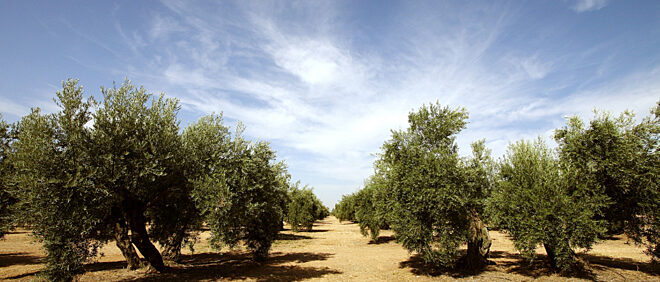
PHENOILS. New technologies implementation in RIS regions’ olive oil mills for healthier olive oil extraction
This programme incorporates new physical technologies in the extraction of the virgin olive oil process in order to produce oils with a higher amount of minor components with higher preventive effects such as polyphenols and tocopherols.
Extra virgin olive oil has been a focus of interest since ancient times by diverse society sectors, currently, that interest is not only focused in its unequalled organoleptic characteristics, but in several studies whose main theme have been diverse roles in health of EVOO, thanks of usual consumption as vegetable fat rich in monounsaturated fatty acids.
Even though currently competition against other vegetable oils which are cultural linked with other populations, it is worth mentioning that benefits in health provide by EVOO are unrivalled.
All above means that special interest on minor components of EVOO and especially of Polyphenols, which provides benefits in health, as stated by EFSA.
Main problem is that not all olive oils have this amount of polyphenols, due to diverse factors (cultivar, date of harvesting, temperature of extraction...), as consequence, PHENOILS promotes obtention of EVOOS naturally enriched in polyphenols with those innovative extraction techniques studied in more competitive prizes that allows to the consumer best accessibility.
Stages
- New extraction technologies will be carried out at Industrial scale.
- Extracted olive oil physical-chemical and organoleptic parameters evaluation.
- Olive oil shelf-life and mathematical predictive modelling.
- Study of economic and commercialization feasibility of the technologies
- Professional educational program.
Programme 2020
- Study of the evolution of minor compounds of different virgin olive oil obtained during campaign 2019-2020 in 4 different countries (Portugal, Spain, Italy and Greece):May 2020
- Pilot plant trials of the new technologies in Italy, Spain and Portugal: September-November 2020
- Extracted olive oil physico-chemical and organoleptic parameters evolution: October-November 2020
- Olive oil shelf life and mathematical predictive modelling: November-December 2020
- Study of economic and commercialization feasibility of the technologies. November-December 2020
- Educational programme: October-November 2020
- Master degree in Science and Technology of Oils and Fermented Beverages Program carried out by CSIC in collaboration with the University Pablo de Olavide (Seville).
- STF0028- Metodologie di sviluppo di processo farmaceutico (IV course of Degree on pharmaceutical chemistry and technology).
- STF0243-a.l. Nuove tecnologie per estrazione e sintesi di composti naturali bioattivi (Degree on pharmacy).
- BIO0189 - Enabling technologies in drug synthesis and processing (Degree on molecular biotechnology)
Impact 2020
- The urgency and usefulness of innovation in the olive oil industry will be conveyed.
- New physical technologies in the extraction process will be incorporated in order to produce oils with a higher amount of minor components.
- Local olive oil producers will be able to produce high added-value olive oil and converge in competitiveness.
- Students and producers will be provided with toolsets, training and expert support to adapt and implement the innovative solution.
Conclusions 2020
After having carried out all the trials planned during 2020 and having tested 3 technologies (PEF, US and Cavitation), with 4 different fruits varieties in two different maduration stages, PEF and US technologies have been selected as potential for increasing the content of polyphenols and for their good performance in extraction. For this reason, these two technologies have been selected as optimal to be tested in a higher scale pilot plant, in an independent form and in a combination form, to continue optimizing the good results.
Regarding degradation of phenols and tocopherols during the storage, it was observed that the type of extraction process, both the control and the process with the application of PEF, were not influential, as a similar degradation was produced in both processes.
Longer storage times, and higher temperature and light exposure would likely have had a greater impact on the phenolic composition.
The greatest potential (as identified by the simulations) for preserving the antioxidative system as long as possible (under dark storage conditions) is: 1. to ensure a minimum leak rate of the cap and 2. minimizing the oxygen in the oil and head space after production and 3. maintaining a high concentration of possible H-donors to partially regain oxidised polyphenols and tocopherols
Results were cleary determinant and better for the glass EVOOs
High expectatives for the second annuity for obtaining the HPEVOO with the new technology and a mathematical model
Highly interest from the educational community.
Programme 2021
Study the requirements for the adaption of the two selected new extraction technologies, ultrasound and pulsed electronic fields (PEF), in the high scale pilot olive oil mills.
Two olive varieties will be used in Italy, Portugal and Spain for extraction tests.
Extracted oil will be analyzed both physical-chemical parameters and sensory characteristics using regulated analysis and panel test, in order to quantify the improvement of extraction of minor components among technologies and the influence of variety and maturity index.
FFA, Peroxides, Insoluble impurities, moisture, K, Organolectic properties, Fatty acids Sterol, Tocopherols and polyphenols.
In addition, during 2021 the yield of extraction will be measured to quantify the improvement of previous factors.
A transparent open call will be opened in Portugal in order to choose the right plant for ultrapulse pilot plan validation. This technology will be tested in Spain too.
Study of the evolution of each oil obtained during 2021-2022 during the self-life both a normal and accelerated storage condition, as well as quality characteristics and sensory profile under glass bottles.
Development of a mathematical model to predict the evolution of the initial parameters in this kind of oils.
Study the extra cost related to the implementation of the technologies and the economic advantages for the producer.
Educate consumers about the advantages of olive oil minor components.
Master degree in Science and Technology of with Greek institutions, after Oils and Fermented Beverages Program carried out by CSIC in collaboration with the University Pablo de Olavide (Seville).
UNITO will organize another course in their facilities with similar characteristics for Italian student and professionals.
A third course will be conducted in Greece, in collaboration with Greek institutions, after publishing a transparent OPEN CALL.
Impact 2021
Innovative extraction technologies have been studied to obtain healthier Extra Virgin Olive Oils enriched in polyphenols (HPEVOOs) and best oil yield.
Those characteristics are of interest for local olive oil producers which could produce high added value olive oils.
Innovative extraction techniques have been tested at High pilot scale, approaching to the industrial one.
Innovative techniques have been tested in RIS countries, intimately linked with olive oil sector, increasing their potentially consumption.
A predictive mathematical model is being developing in relation to study the behaviour of those oils obtained through their shelf life.
Personnel interested in olive sector as students, technical personnel, producers and consumers have been informed by several seminars, courses and masterclass about the progress on the project with the objective to apply innovations in olive oil sector.
Programme 2022
Obtain final data about minor components ‘behaviour of EVOOs studied in previous seasons (Nov-Dec. 2022).
In 2022 will be carried out trials at Industrial scale in oil mills from Spain, Portugal and Italy (Sept-Nov.2022).
It will be carried out Physicochemical and organoleptic analyses of obtained oils (Oct-Nov. 2022)
To obtain results from shelf-life study of oils after developing a study in annuity 2022 with predictive mathematical model (Nov-Dec.2022)
To carry out studies about feasibilities and commercial viabilities of products and techniques obtained in PHENOILS (Nov-Dec. 2022)
Educational programm (Oct-Nov. 2022).
Master’s degree in science and Technology of Oils and Fermented beverages Program carried out by CSIC in collaboration with the University Pablo de Olavide (Seville).
Diverse courses taught by University of Turin online as past annuities.
Masterclass taught in Greece, as last annuity in University of Thessaly.
Workshop taught in Croatia, will be necessary an Open call to do it due to there is not partner involved from Croatia.
Impact 2022
- Innovative extraction technologies have been studied to obtain healthier Extra Virgin Olive Oils enriched in polyphenols (HPEVOOs) and best oil yields.
- Those characteristics are of interest for local olive oil producers which could produce high added value olive oils.
- Innovative extraction techniques have been tested at Industrial Scale with autochthonous olive cultivars.
- Innovative techniques have been tested in RIS countries selected (Italy, Portugal and Spain), highly linked with olive oil sector, increasing their potentially consumption.
- A predictive mathematical model has been developed with the aim to predict the evolution and behaviour of the minor components of interest for the consumer and the project, of those oils obtained through their shelf life.
- Personnel interested in olive sector as students, technical personnel, producers and consumers have been informed by several seminars, courses, masterclass and workshop in RIS countries selected (Italy, Spain, Portugal and Croatia) related to the updates and findings of the project with the objective to apply innovations in olive oil sector
Conclusions 2022
In 2022´s annuity, Industrial scale of the project have taken place with 3 autochthonous olive cultivars at same ripening stage (medium one) in RIS countries selected due to their high linkage with olive oil sector.
Olive cultivars selected for industrial trials have been: Coratina in Italy, Arbequina in Spain and Cobrançosa in Portugal.
It was carried out trials with innovative extraction techniques at Industrial Scale with the Innovative extraction techniques selected from previous annuity: Pulsed Electric Fields, Ultrasonds and both combines (PEF+US).
Once samples were obtained and analysed at time 0, rest of samples were storage in climatic chamber with extreme conditions of light and temperature (40 °C and 12 light hours per day), with total storage of 30 days, obtaining oil samples each 15 days to analyse them analytical and organoleptic along with predictive mathematical study to understand evolution and behaviour of their minor components.
Related with time 0 samples obtained, an increase of oil yield have been observed in the diverse trials carried out with innovative extraction techniques, providing an added value to the use of those innovative extraction techniques along with the increase of polyphenols content of the oils.
An innovative extraction technique tested have showed an increase of the polyphenolic content of the oils a time 0 without negative effects for the rest of oil characteristics, as the objective of the project could be successfully found.
The rest of tests carried out at industrial level in 2022 have suggested possibilities with the rest of innovative extraction techniques tested related to their industrial use.
Project lead
Related Projects







